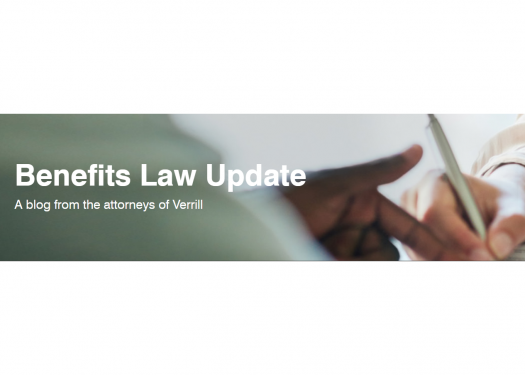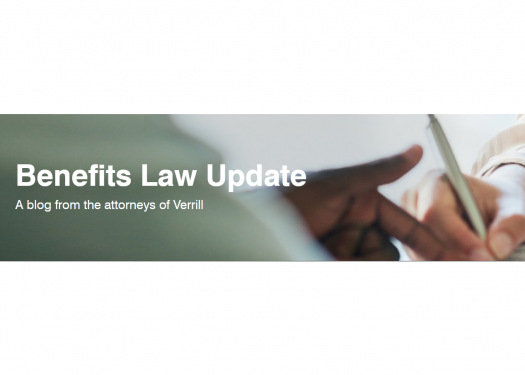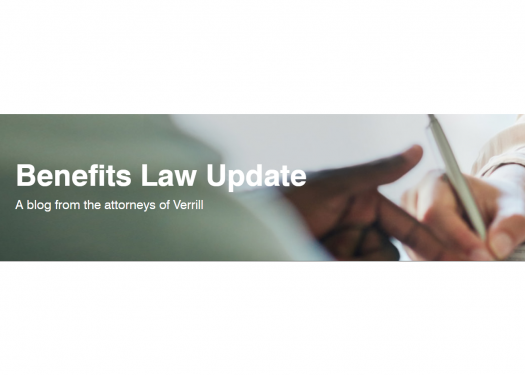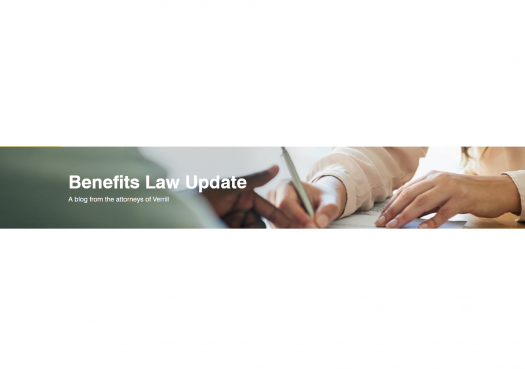IRS Guidance Expands Access to ACA Premium Tax Credit, Allows Cafeteria Plan Sponsors to Permit Employees to Revoke Family Coverage Mid-year
Final Regulations under Section 36B of the Internal Revenue Code On October 11, 2022, the Internal Revenue Service (IRS) issued Final Regulations under Code Section 36B relating to eligibility for the Affordable Care Act’s (“ACA’s”) premium tax credit (“PTC” or “subsidy”). The Final Regulations expand eligibility for the PTC...
New IRS Determination Letter Program for 403(b) and 401(a) Plans
On November 7, 2022, the IRS issued Revenue Procedure 2022-40 , which allows certain tax-exempt employers (such as schools, charities, and churches) to apply for IRS determination letters on their individually designed section 403(b) retirement plans (“403(b) plans”) in substantially the same manner as plan sponsors of individually designed...
ERISA Section 404(c) Protection: A Refresher for Fiduciaries
The Employee Retirement Income Security Act (“ERISA”) imposes both (i) significant responsibilities on fiduciaries of participant-directed individual account plans, including 401(k) plans, and (ii) personal liability for losses suffered by a plan if those responsibilities are breached. Fortunately, ERISA provides important relief from liability for investment losses for these...
Proposed Changes to Massachusetts Paid Family & Medical Leave Regulations
The Massachusetts Department of Family and Medical Leave has proposed changes to the regulations governing the state’s paid family and medical leave program. The proposed changes are intended to clarify the requirements related to maintaining health insurance benefits for employees on family or medical leave. While the proposed changes...
The How and When of Separations from Service Under Section 409A
Readers who regularly work with deferred compensation plans will know that Section 409A of the Internal Revenue Code (“Section 409A”) prescribes six events or times at which deferred compensation may be distributed to participants in a deferred compensation arrangement. The first, and perhaps most frequently used, of these permissible...
Amending Your Retirement Plans this Year for SECURE Act and CARES Act Changes
This post was updated on September 29, 2022. On August 3, 2022, the IRS extended the deadline for retirement plan sponsors to adopt amendments necessary to comply with the Setting Every Community Up for Retirement Enhancement Act of 2019 (the “SECURE Act”) and the Bipartisan American Miners Act of...
2025 Is the New 2022: IRS Extends Deadline to Adopt SECURE Act Amendments and CARES Act Waiver of 2020 RMDs Amendment
This post was updated on September 27, 2022. On August 3, 2022, the IRS released Notice 2022-33 , which extends the deadline for plans to adopt: all SECURE Act [1] amendments, optional or required (a summary of SECURE Act changes can be found here ); CARES Act [2] amendments...
DOL Proposes Amendments to QPAM Exemption
On July 27, 2022, the Department of Labor (DOL) proposed a set of amendments to Prohibited Transaction Class Exemption 84-14, the so-called “QPAM Exemption,” which permits an investment fund [1] holding assets of ERISA plans and IRAs that is managed by a Qualified Professional Asset Manager (“QPAM”) to engage...
Agencies Heed President’s Call to Take Action to Protect Access to Sexual and Reproductive Health Care Post-Dobbs
Within days of the Supreme Court’s June 24 th Dobbs decision, which held that the Constitution does not guarantee the right to an abortion, key government agencies have taken action to protect access to sexual and reproductive health care: On June 27, the Secretaries of the Departments of Health...
What Employers Need to Know About Access to Reproductive Care After Dobbs
The United States Supreme Court’s decision in Dobbs v. Jackson Women’s Health Organization , No. 19-1392 (June 24, 2022) overturning Roe v. Wade and Planned Parenthood v. Casey, has led to a host of different responses from employers across the country—specifically those with employees in states that now ban...
Health Plans: PCORI Fee Is Due August 1, 2022
What is the PCORI Fee? The Affordable Care Act created a non-profit corporation, the Patient-Centered Outcomes Research Institute (“PCORI”), to conduct research to help individuals, providers, and policymakers make better healthcare choices by advancing comparative clinical effectiveness research. PCORI is financed by a fee imposed under Internal Revenue Code...
IRS Announces New Pilot Program for Retirement Plan Audits
On June 3, 2022, the Internal Revenue Service (“IRS”) announced a new pre-examination compliance pilot program beginning in June 2022. Under the pilot program, the IRS will notify a plan sponsor by letter that its retirement plan has been selected for examination and will provide the plan sponsor with...
Department of Labor Guidance and Federal Initiatives Counsel a Wait-and-See Approach for 401(k) Plan Fiduciaries Interested in Cryptocurrency Options
On March 10, 2022, the Department of Labor published Compliance Assistance Release 2022-01, 401(k) Plan Investments in “Cryptocurrencies” . The Release strongly discourages the addition of cryptocurrency (and other digital asset) options to the investment menus in ERISA retirement plans at “this early stage in the history of cryptocurrencies.&rdquo...
DOL Signals Heightened Enforcement of Non-Quantitative Treatment Limitation Requirements
Introduction . When the U.S. Department of Labor issued its biennial 2022 Mental Health Parity and Addiction Equity Act (“MHPAEA”) Report to Congress earlier this year, it outlined significant noncompliance by health plans. (Full Report here .) Specifically, it found that plans were not complying with the new comparative...
Proposed IRS Regulations Clarify SECURE Act Changes to RMD Rules for Beneficiaries
When the Setting Every Community Up for Retirement Security Act of 2019 (SECURE Act) took effect on January 1, 2020, it changed the rules for retirement plan required minimum distributions (RMDs) to participants and beneficiaries. Earlier this year, the IRS released proposed regulations implementing those changes. The regulations are...
How many participants is too many for a top hat plan?
A client recently reviewed a census of participants in its deferred compensation plan and found that the covered group amounted to nearly 15% of its total workforce. Mindful of the need to limit the number of participants in a top hat plan, this compliance-oriented organization asked whether it should...
Deciphering First Circuit’s Thirty-page Primer on NQTL Analysis and ERISA Information Requests
The widely publicized 2022 Report to Congress regarding the Mental Health Parity and Addiction Equity Act (“Parity Act”) forewarned greater enforcement efforts by the Department of Labor and highlighted suspected deficiencies in health plans’ compliance with the Parity Act. In addition, the First Circuit’s recent decision in N.R. v...
How to Shoot Yourself in the Foot with Your SPD
Benefit plan sponsors sometimes send out Summary Plan Descriptions (SPDs) having given too little thought to the legal consequences. Two recent cases illustrate how an organization can end up in serious and costly litigation based on statements that did not have to be made in SPDs that did not...
Surprise Medical Bills: Texas District Court Vacates Portion of Independent Dispute Resolution (IDR) Process in Agency Rule
The U.S. District Court for the Eastern District of Texas recently vacated a portion of the Requirements Related to Surprise Billing, Part II, Interim Final Rule (the “Rule”) regarding the independent dispute resolution (IDR) process that applies to surprise medical bills. [1] Specifically, the Court vacated a controversial provision...
Correcting 401(k) Plan Excess Elective Deferrals
With the April 15 deadline for distributing excess elective deferrals fast approaching, this post summarizes the rules for correcting excess elective deferrals made to a 401(k) plan. In brief, excess elective deferrals not distributed from a 401(k) plan by April 15 of the calendar year following the calendar year...
Required Minimum Distributions and Missing Plan Participants

In January of 2021, we published two blog posts regarding Department of Labor (“DOL”) guidance on missing retirement plan participants. The first post describes DOL guidance on best practices for locating missing retirement plan participants. The second post describes the DOL’s Terminated Vested Participants Project (“TVPP”), which was initiated...
Unanimous Supreme Court Overturns Court of Appeals in Northwestern University 403(b) Plans Excessive Fee Case
The United States Supreme Court has agreed with participants in two 403(b) plans sponsored by Northwestern University that their lawsuit, alleging that plan recordkeeping and investment fees were excessive, should not have been dismissed. On January 24, 2022, the Court sent Hughes v. Northwestern University (Jan. 24, 2022) back...
Elimination of Good Faith Relief for ACA Reporting
On November 22, 2021, the Internal Revenue Service (IRS) published proposed regulations that codify, among other things, an automatic extension of the deadline for furnishing IRS Forms 1095-C to employees. IRS Forms 1095-C are the annual information returns required by the Affordable Care Act (ACA) for reporting offers of...
Nonqualified Deferred Compensation and the Special Timing Rule HR Professionals Should Be Aware of for FICA Tax Purposes

Twenty years ago this month the Enron Corporation imploded in spectacular fashion and declared bankruptcy. In the weeks leading up to its bankruptcy filing, over 100 highly compensated employees raced to receive early distributions of nonqualified deferred compensation, and were ultimately successful in removing over $50 million from the...
403(b) Plan Compliance with the Annual Additions Limit: IRS Expects 403(b) Plan Sponsors to Collect Information About Employees’ Outside Employment
This post was updated on September 27, 2022. In a recent Issue Snapshot about how the annual limit on retirement plan contributions under Section 415(c) of the Internal Revenue Code (“Code”) applies to 403(b) plans, the IRS revealed that it expects 403(b) plan sponsors to maintain procedures to inform...
You Are Here: A Mall Directory for Healthcare Transparency Requirements
The old adage “you can’t get where you’re going unless you know where you are” has never seemed more true than when applied to the current mélange of healthcare transparency guidance. Fortunately, a fading relic from America’s malls may provide a helpful way to think about organizing and navigating...
Using a Non-Compete to Create a Substantial Risk of Forfeiture Under a Section 457(f) Plan: Limited (But Meaningful) Opportunities

The Treasury Department’s proposed regulations regarding the income tax treatment of “ineligible plans” of tax-exempt employers under Code Section 457(f), published in June 2016, were greeted with much fanfare. (You can review our initial commentary on the proposed regulations here . Final regulations have not yet been published, but...
Thoughts on the DOL’s Proposed ESG Regulation

The latest installment in the regulatory back-and-forth over the investment of ERISA-governed retirement plan assets based on environmental, social, and corporate governance (“ESG”) factors arrived on October 14, 2021 in the form of a newly proposed regulation on “ Prudence and Loyalty in Selecting Plan Investments and Exercising Shareholder...
IRS Issues Guidance Clarifying the Application of COVID-19 Outbreak Period Extensions for Electing COBRA Continuation Coverage and Paying COBRA Premiums
On October 6, 2021, the IRS issued Notice 2021-58 , providing helpful guidance on COBRA continuation coverage in two key areas: (1) the application of the extended timeframes for electing COBRA continuation coverage and paying COBRA premiums in response to the on-going COVID-19 national emergency, and (2) the interaction...
Recent Court Decisions Extend the Statute of Limitations for Breach of Fiduciary Duty Lawsuits under ERISA
ERISA Fiduciary Duties and Liability Under the Employee Retirement Income Security Act of 1974, as amended (“ERISA”), a plan fiduciary must (i) act prudently, for the exclusive purposes of providing benefits to plan participants and defraying plan expenses, and in accordance with plan documents, and (ii) invest plan assets...
Page 2 of 10









